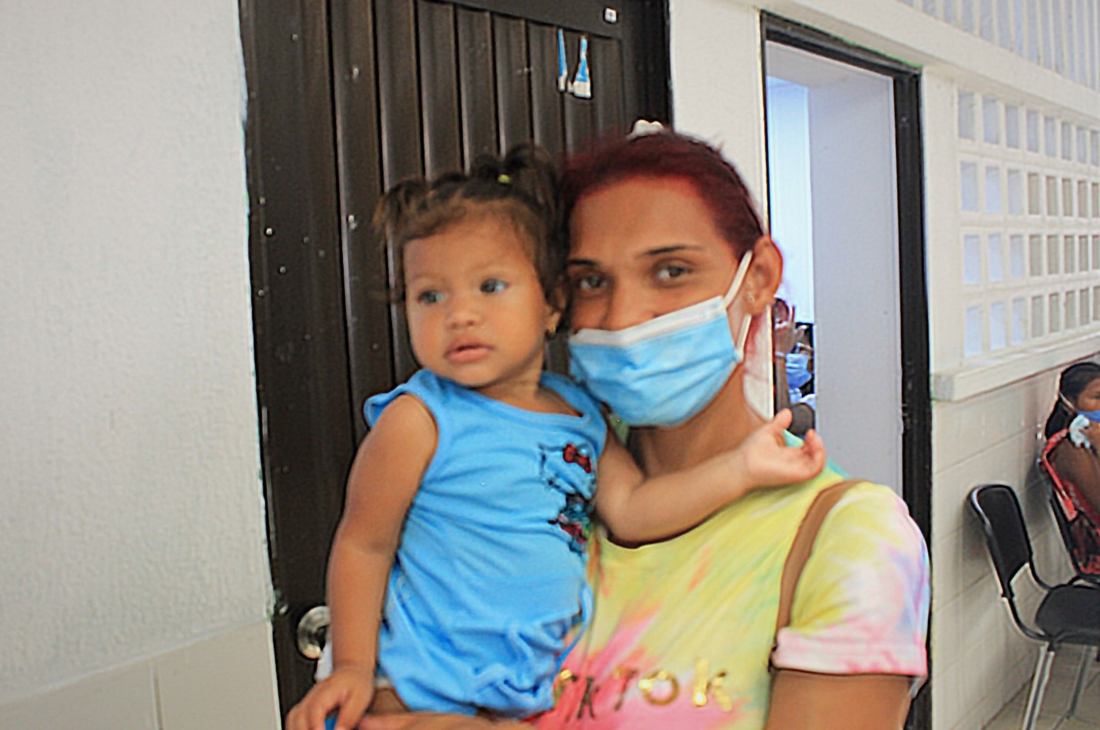Opening the Door to Health Care for a Two-Year-Old Venezuelan Migrant
Date

Jessica and her daughter at a health insurance enrollment event in Barranquilla. (Photo: Jessica Paba/LHSS Colombia)
Meet Jessica. A 32-year-old mother of three, Jessica migrated to Colombia from Venezuela four years ago. Because she lacked a special residency permit, she and her children were not eligible to enroll in Colombia’s national health insurance system, a program that provides health care coverage for 98 percent of Colombian citizens. When one of her kids needed to see a doctor, Jessica’s only option was to go to a hospital emergency room.
That all changed in 2021, when Colombia granted temporary legal status for the estimated 1.5 million Venezuelan migrants living in the country without residency permits.
“It was a defining moment for us,” said Jessica. The first thing she did was enroll her two-year-old daughter in the national health insurance system. She planned to enroll her other two children as soon as their temporary protection permits arrived.
“I can't describe what it feels like to know that my kids’ needs will be taken care of. I feel thrilled. Leaving Venezuela has been challenging for many of us, but today I feel like I have options," Jessica told an LHSS staff member at an enrollment event in December 2021.
Jessica’s little girl is one of more than 40,000 migrants who have been enrolled in Colombia’s national health insurance system with support from the LHSS Project. Working with health authorities in 10 areas of the country with large migrant populations, LHSS supports enrollment days where Venezuelan migrants get help with the enrollment process. Trained workers explain the national health insurance system, answer questions, and assist with filling out forms.
Heading
Partnering with community organizations is key
Partnering with community organizations is key
Community-based organizations engaged by the LHSS-Colombia team are playing a crucial role. These local organizations, such as Mahuampi in Bogota and Santo Angel in La Guajira, already work with and are trusted by migrants. They spread the word about enrollment events and the enrollment process across their popular WhatsApp, Instagram, Twitter, and Facebook channels, and help at enrollment sites.
Aura Cabeza, an LHSS consultant in the department of Norte de Santander, which has one of Colombia’s largest migrant populations, described the difference it can make to have people from these local community groups participate in enrollment events.
“At first, the migrants seem very anxious because they don't know if they will be eligible for enrollment, as they don’t have a regular migrant status. But when the community-based organizations provide information, migrants feel more confident,” said Cabeza, who supports enrollment activities.
“That is why our work with migrant organizations is vital. Their brotherhood is impressive. When they have worked with us, the enrollment numbers increase."
To promote the sustainability of LHSS’s enrollment work in Colombia, the project supports capacity development for community-based organizations and will award grants to 12 selected organizations to expand on their role as active participants in the enrollment process.
